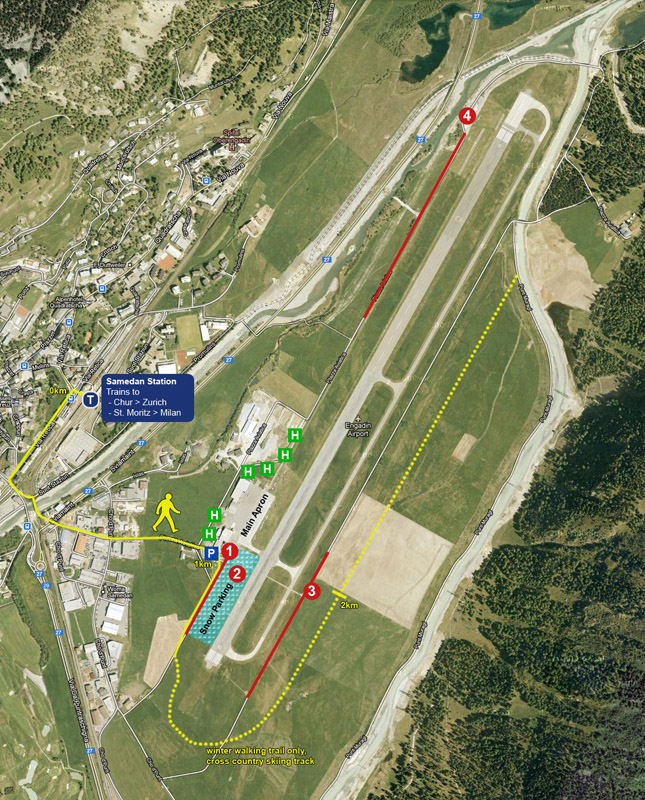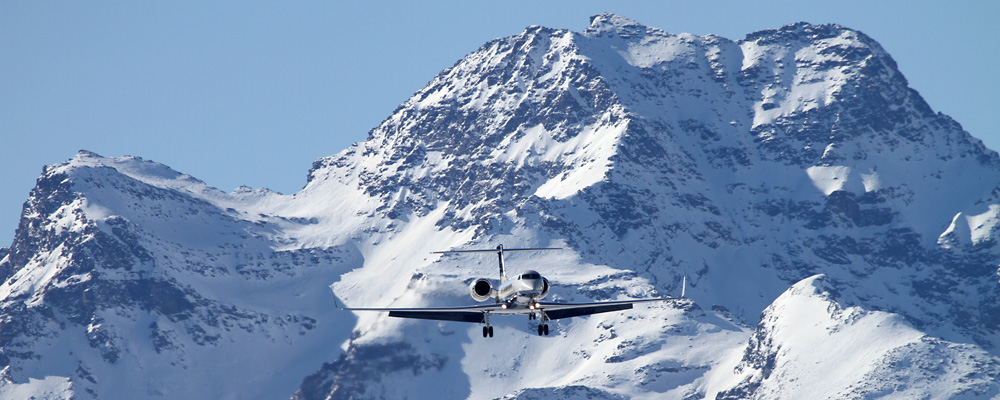
Introduction and Operations
Due to its location in a high and narrow mountain valley, Samedan is like no other airfield. For a start, it does not have any IFR procedures and therefore only operates in weather conditions that allow visual flying – a minimum visibility of 5 kilometers and a cloud ceiling of at least 700 meters above ground level to be precise. Secondly, the relatively short runway means that the largest airplanes that can land here are Boeing 737 and Airbus A319 in light (i.e. private jet) configurations.
Seasons & Special Dates
During the summer months, Samedan is relatively quiet and traffic consists mostly of small General Aviation airplanes, while of course there can always be a biz-jet popping in. Things are far more interesting in the winter season though. As soon as the skiing in St. Moritz and the valley begins, the VIPs start flocking in for some fun on the slopes. Generally, most traffic can be expected on (nice) weekends, starting from Christmas and lasting way into March. However, there are some special events that generate lots of additional traffic, so those are your best bets to get the most action. Those are the World Economic Forum held in nearby Davos, and most importantly the “White Turf” International Horse Races taking place in St. Moritz, usually spanning three weekends.
Operations
As all operations are under Visual Flight Rules (VFR), pilots of approaching jets are required to cancel their IFR flight and continue visually. There are villages serving as visual reporting points: Maloja 10 miles south of the field for approaches to Rwy 03, and Zernez 10 miles to the north for Rwy 21.
Rwy 03 seems to be the preferred runway in zero wind conditions, but Rwy 21 can be in use if the wind requires it.
As parking facilities are extremely limited, in winter time, additional parking spaces are created on compacted snow south of the terminal buildings (known as “snow parking”). These are available only for aircraft up to an maximum take-off weight (MTOW) of 4 tons, limiting it to small GA aircraft up to small biz-jets like Cessna’s lighter Citation variants (C525) or Embraer Phenom. All heavier aircraft (Cessna Citation X, Dassault Falcon, Embraer Legacy, larger Gulfstreams, etc.) are limited to the standard concrete apron, which can accommodate about up to about 10 of those planes.
For an in-depth look at operations, check out the following documents:
ATC Frequencies
There is no air traffic control proper, but just a flight information service. This means that the controllers are limited to providing information about weather, operations and other traffic, but cannot give instructions like landing clearances.
ATIS (weather information): 136.600
AFIS (flight information service): 135.325
Swiss Radar (above FL100): 128.050
Timetable
One extremely nice gesture towards planespotters is the airport’s official timetable including most of the biz-jet movements. The timetable for each day is available from shortly after midnight, but usually sees heaps of additions and changes throughout the day. The timetable can be accessed here. Grey rows are arrivals (the letters DEP saying the aircraft has departed at its origin), blue rows are departures. Red rows saying CNL mark cancelled flights
Check timetable: http://timetable.engadin-airport.ch/
Getting there

To Samedan
The village from Samedan is located about 6km north of the famous ski resort of St. Moritz, in the Engadin valley in the southeastern corner of Switzerland. This remote location makes getting there a lengthy trip.
By car, Samedan is located a 90km/90min drive from Chur, the next major city. It's 200km/3 hours from Zurich and 180km/3 hours from Milan, while "only" 180km/2h from Innsbruck in Austria. Getting there by train via Chur is a breathtaking ride leading through a UNESCO world heritage site. Travel time to Chur is about 2 hours, plus one more hour to Zurich or two more to Bern and Basel.
To the Airport
From the train station, follow the yellow marked path on the map below. It is approximately 1 km to the airport terminal, and another 1 km to the spotting points on the southeastern side of the field. There's limited parking (about 30 spaces maybe) available at the terminal, not costing more than 10 Swiss Francs for a whole day's stay.
Ramp Access for Planespotters
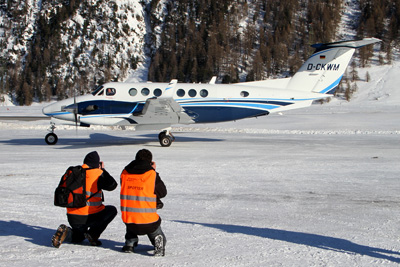 There is a long lasting friendship between the airport and the many visiting planespotters. In addition to the timetable, the airport authority also provides the possibility to take pictures on the apron. While this service is free of charge, some restrictions had to be implemented after repeated bad experiences in the previous years. In order to be granted airside access, the following steps must be taken and need to be repeated each year:
There is a long lasting friendship between the airport and the many visiting planespotters. In addition to the timetable, the airport authority also provides the possibility to take pictures on the apron. While this service is free of charge, some restrictions had to be implemented after repeated bad experiences in the previous years. In order to be granted airside access, the following steps must be taken and need to be repeated each year:
- Completing the online Spotters' Briefing
- Passing an online test of 30 varying questions about general operations and behaviour airside, answering more than 80% of the questions correctly. The test follows after the Briefing linked above. Once the test is passed, a confirmation e-mail will be sent to both the applicant and the airport authority.
- At the first visit, the applicant may only go airside together with a Spotter Guide. There are no fixed times when those guides are around, however, there's usually a guide available on busy weekends with nice weather.
- Only once a Spotter Guide has checked out the applicant, he or she may access the apron on his/her own in the future
- There is a limit of 15 spotters allowed airside, on a first come first serve basis. This limit can easily be reached on days with good traffic and weather, therefore it is recommended to show up early (before 10AM).
All that being said, the benefit from ramp access is not as huge as one might think. Even from the outside you get extremely close to the action and can take great shots of all movements. The only advantage of being airside is the possibility to take close-up wide-angle shots of parked aircraft.
Spotting Points
Click on the picture above for a larger, A4-sized map
Spot 1: Airport Parking Area & nearby area
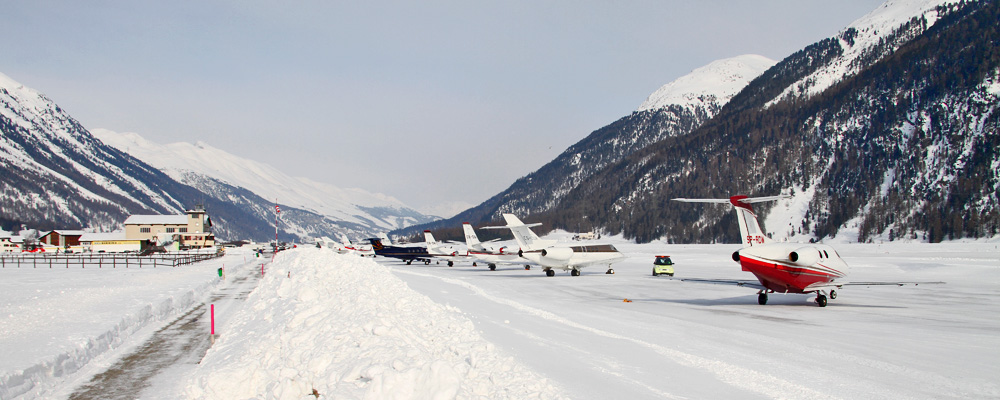
The area centering around the airport parking provides you with lots of vantage points to cover all kinds of situations, and is therefore your best bet in the second half of the day, once the sun has moved around to the western side of the runway.
| See "Getting There" section above. There's limited parking available right next to the terminal/apron. | |
| Restaurant and Toilets available inside the terminal | |
| Starting from 20mm for shots on the snow apron, 100-200mm for planes in the runway axis to 400mm for action shots | |
| All operations. Acft parked on snow park and main apron. Acft lining up Rwy 03 (walk to the southern end of the snow park for this). Acft entering the apron area. Acft approaching Rwy 03. Heavier Biz-Jets departing out of Rwy 21. | |
| From 2PM till sunset for runway shots (winter); good almost all day for acft entering the apron or lining up on Rwy 03. | |
| As the fence is only waist-high, and there's usually lots of snow around to stand on anyway, a ladder isn't required. |
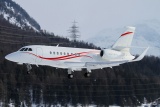 Approaching Rwy 03 |
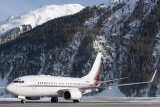 Entering the apron |
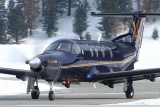 Lining up Rwy 03 |
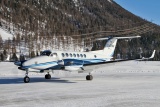 Taxiing on Snow Parking |
 Parked on Main Apron |
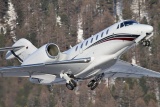 Departing Rwy 21 |
Spot 2: Apron Access
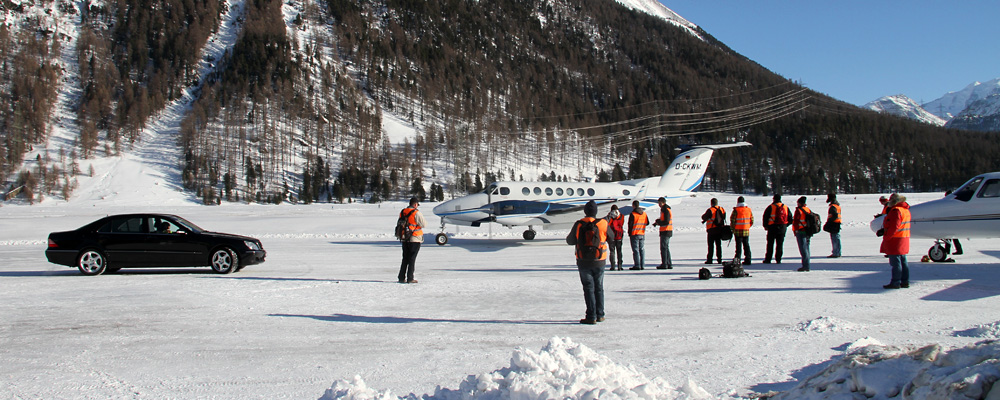
| See "Ramp Access" section above. Only a limited number of safety vests is available. | |
| Restaurant and Toilets available inside the terminal | |
| Starting from 10mm for shots on the snow apron, 100-200mm for planes in the runway axis to 400mm for action shots | |
| Everything that can be seen from Spot 1, plus the possibility to get very close to acft parked on the snow apron and fairly close to the one on the main apron. | |
| From 2PM till sunset for runway shots (winter); good almost all day for acft entering the apron or lining up on Rwy 03. The way the aircraft were parked on the snow apron in 2012 (nose pointing east), the first half of the day was best for shots of those. | |
| It is forbidden to take pictures of people (passengers), and to enter aircraft. Please stick to all rules and follow all instructions while airside. Thanks! |
 Parked, pointing east |
 Parked, pointing west |
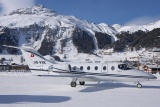 Taxiing on Snow Apron |
Spot 3: Southeastern Side

The area centering around the airport parking provides you with lots of vantage points to cover all kinds of situations, and is therefore your best bet in the second half of the day, once the sun has moved around to the western side of the runway.
| From the Terminal, it's a 1km/15min walk on a path of compacted snow, shared with cross country skiing tracks. You can leave that path towards the runway anywhere you like - either position yourself at the taxiway crossing the runway or with a good view of the line-up. Do not go closer to the runway then the fence poles, even if they're partly covered in snow. | |
| Restaurant and Toilets available inside the terminal, nothing available at the spot | |
| 100-200mm for planes in the runway axis, up to 400mm++ for stunning approach shots, as little as 20mm for acft taxiing by. | |
| All operations. Planes arriving to, taxiing to, and lining up on Rwy 03, Planes taxiing or taking off on Rwy 21, Planes taxiing to/from the apron. | |
| First half of the day until 2PM for runway shots; good almost all day for aircraft crossing the runway. | |
| Possible high snow mounds partially obstructing runway/taxiway views. As the fence is only waist-high, and there's usually lots of snow around to stand on anyway, a ladder isn't required. Do not walk past the fence posts towards the runway! |
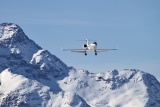 Early approach Rwy 03 |
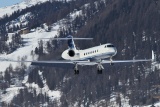 Approach Rwy 03 |
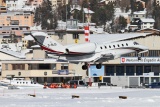 Landing Rwy 03 |
 Crossing Rwy 03 for TO |
 Taxiing to Rwy 03 |
 Lined up Rwy 03 |
Spot 4: Northwestern Side
Spotting possibilities on the northwestern side of the airport are equally good as elsewhere; however, usually people seem to stick to the southern spots. Since the fence running along the runway is only waist-high, you can basically position yourself anywhere to capture runway movements. Light starts to be okay from 2PM on in winter time and about 100-200mm should be enough for runway views.

